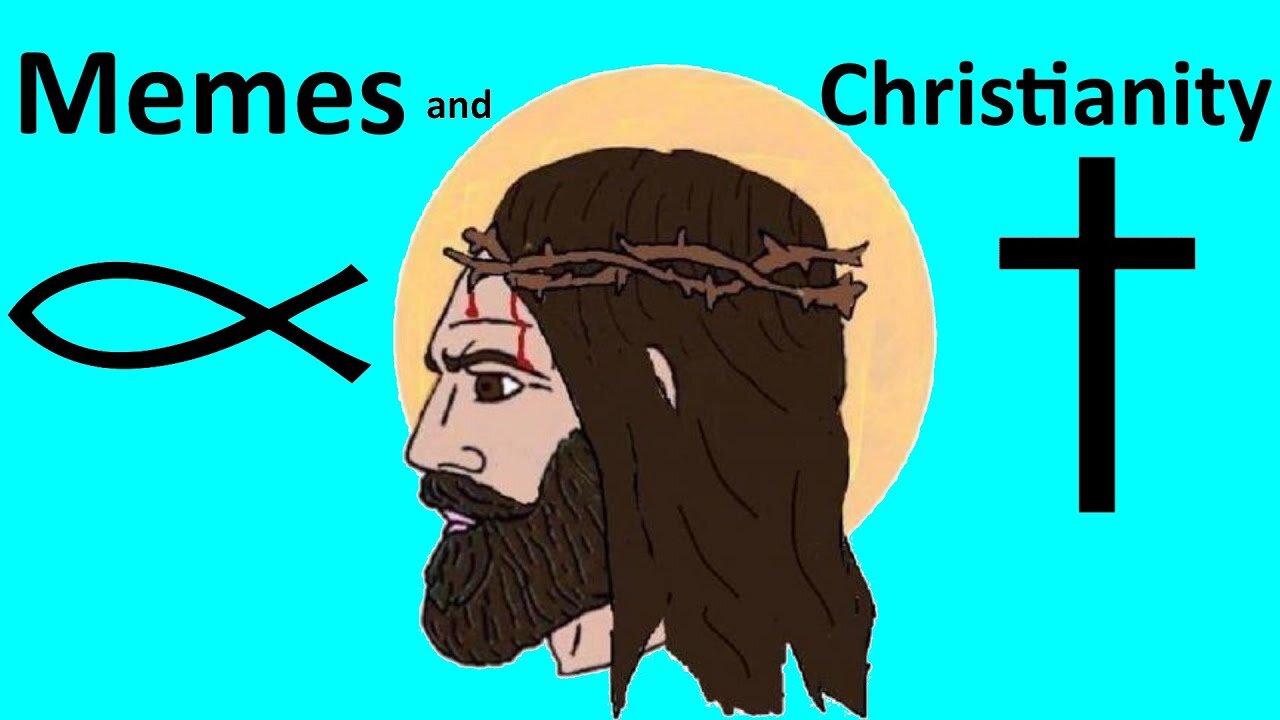Premium Only Content

Christian Memetics - Meme Analysis
BY:MemeAnalysis on youtube
What does Christianity have to do with memes? Quite a lot! Memes have played an extremely important role in the origin and history of Christianity and the Church. Let’s start by clarifying what “Meme” means. Meme seems like a loaded word, in large part due to the internet, but the original definition is not far off from the modern one. They are “units of cultural transmission” a definition that largely falls into the Jungian category of a “Symbol” or on a larger scale, and an Archetype.
So what are some of the most important Christian Memes or Symbols?
The two of the most important are the Cross and the Fish. Both were used in early times as signifiers of the faith. Whether as graffiti or jewelry. These images served not only as symbols of the Christian faith to the outside world, but as internal symbols of the great Christian mysteries.
Of the Cross, the philosopher Nietzsche, a devout Anti-Christian writes:
"Christ on the cross" is
the most sublime symbol
—even today.'
-Nietzsche, The Will to Power
Why is this? Simply put, the Cross is the most effective Meme. It transmits the entire Christian Narrative in one of the most simplistic and recognizable images. Two lines. Two lines tell what is referred to as the Greatest story ever told. The Gospel, the Good News. The Cross transmits and symbolizes all of this in a way that is unparalleled.
Beyond even the base Christian narrative, nearly all subsequent Occult systems have either retooled the symbol of the Cross, as in Rosicrucian orders, or reversed it, as in simple Satanic groups.
In my video on the Loss meme, I briefly explored the idea that there are a series of archetypal geometric figures that are understood intrinsically by our Unconscious Minds. The Cross represents what may be the simplest figure with the greatest depth.
"In view of this wide distribution of the fish symbol, its appearance at a particular place or at a particular moment in the history of the world is no cause for wonder. But the sudden activation of the symbol, and its identification with Christ even in the early days of the Church, lead one to conjecture a second source. This source is astrology.”
...
It has long been known that all the instinctual forces of the psyche are involved in the formation of symbolic images, hence sexuality as well. Sex is not "symbolized" in these images, but leaps to the eye. In whatsoever a man is involved, there his sexuality will appear too. The same is true of the fish symbol if one continues to be astonished that this image, like all others, has its manifest sexual components. With regard to the terminology, it should be noted that something known is never "symbolized," but can only be expressed allegorically or semiotically.”
-Aion
This mass activation of the Fish symbol is something internet memes have made very clear, at any given time a powerful enough idea can be spread rapidly through very simplistic images and words that are a product of previously repressed instincts. The accompanying synchronicities signify the magnitude of this unconscious idea.
We must also look at one of the most significant but tragic Memes to arise from Christianity, that of the Martyr. Nietzsche identifies the redemptive character of Christ on the Cross as being the very idea which set off what he describes as an “epidemic of death-seeking”. This use of illness based language is no mistake, As William S Burroughs shows, language and image function like viruses. Memes spread in a way similar to the genetic viruses which infect and sicken us, only they do so through unconscious symbolic means. The Christ meme directly energized the Martyr Meme, one which still haunts Christianity to this day.
In the Final part of this video I’d like to examine two more modern memes. The internet based “Meme Christianity” and popular Atheism.
Meme Christianity has become the resounding voice of Christianity on the internet. An unabashed embrace of what most Christians shy away from, namely the Crusades and Imperial Christianity. United under the motto “Deus Vult” a phrase so deeply out of time as to make it comical on its own. This phenomena coincides with the Groyper’s fixation on a traditionalist Catholicism, which again, seeks to return to an imagined past so deeply saturated with modern memetics as to lose any basis in reality.
Where modern Christianity is not cringing in fear of extinction, and desperately selling out the political and scientific mobs, they are antisocial roleplayers, desperate to escape from reality.
Atheism and politics as a far more vicious memetic system, one that has been increasingly prevalent since Nietzsche made it clear that God was Dead, and that Christianity no longer satisfied the Unconscious of the West.
-
 3:06:52
3:06:52
The Nerd Realm
7 hours ago $11.14 earnedHollow Knight Voidheart Edition #19 | Nerd Realm Playthrough
67.2K5 -
 1:17:27
1:17:27
Awaken With JP
9 hours agoThe Current Thing: Tesla Protesting - LIES Ep 82
118K43 -
 1:07:08
1:07:08
Sean Unpaved
6 hours agoNFL Free Agency Rolls On! MLB Spring Training Heats Up along with 3x World Series Champ Dave Stewart
71K3 -
 2:10:15
2:10:15
Right Side Broadcasting Network
11 hours agoLIVE REPLAY: White House Press Secretary Karoline Leavitt Holds Press Briefing - 3/11/25
161K43 -
 2:06:00
2:06:00
The Quartering
10 hours agoTrump Goes NUCLEAR On Canada, Blasts Massie, Harry Potter Race Swap, Man Humiliated On TV Show
114K62 -
 1:03:09
1:03:09
The White House
9 hours agoPress Secretary Karoline Leavitt Briefs Members of the Media, Mar. 11, 2025
111K70 -
 1:07:03
1:07:03
Winston Marshall
9 hours agoEXCLUSIVE : Oliver Anthony On Life After ‘Rich Men’, The Christian Counter Culture and The Elites
73.8K11 -
 1:44:47
1:44:47
Russell Brand
10 hours agoDigital Censorship & Political Warfare: X Attacked, Rand Paul Rebels, Free Speech on Trial – SF551
168K20 -
 LIVE
LIVE
tastylive
9 hours agoLIVE Stocks, Options & Futures Trading with the Pros! (Market Open -> Close & More) March 11th, 2025
127 watching -
 1:35:59
1:35:59
Simply Bitcoin
10 hours ago $4.32 earnedTrumps Bitcoin Embrace TERRIFIES The EU | EP 1200
61.8K8